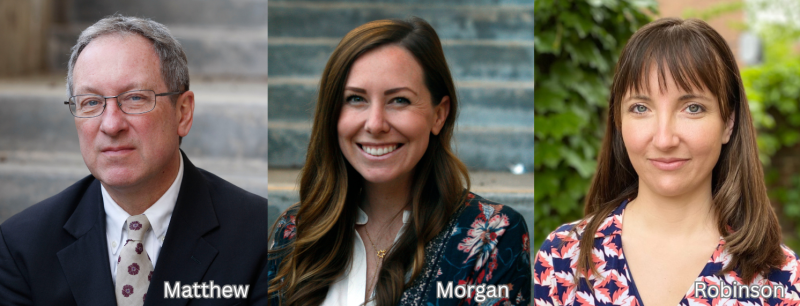
Project receives $75,000 award in Supporting Survivors of Modern Slavery Challenge
Freedom LIfemap, a project that offers survivors of human trafficking a tool to identify their needs and priorities in their journey to freedom, self-diagnose their well-being and create their own solutions and action plans to reach their goals, has been awarded a $75,000 grand prize as a winner in the MIT Solve Supporting Survivors of Modern Slavery Challenge.
The tech-based tool was developed through a partnership between  EverFree and the UC Irvine Blum Center for Poverty Alleviation. EverFree CEO Kelsey Morgan (’24 Ph.D. social ecology); Angela Robinson, Blum Center postdoctoral scholar; Blum Center Director Richard Matthew; and a global cohort of human trafficking survivors led the development of Freedom Lifemap, which is an adaptation of the Poverty Stoplight methodology from Fundación Paraguaya. Poverty Stoplight is a tool that seeks to activate the potential of individuals and families to eliminate multidimensional poverty. It has been adapted worldwide for many different sectors, engaging people as agents of change in their own lives.
EverFree and the UC Irvine Blum Center for Poverty Alleviation. EverFree CEO Kelsey Morgan (’24 Ph.D. social ecology); Angela Robinson, Blum Center postdoctoral scholar; Blum Center Director Richard Matthew; and a global cohort of human trafficking survivors led the development of Freedom Lifemap, which is an adaptation of the Poverty Stoplight methodology from Fundación Paraguaya. Poverty Stoplight is a tool that seeks to activate the potential of individuals and families to eliminate multidimensional poverty. It has been adapted worldwide for many different sectors, engaging people as agents of change in their own lives.
The MIT award is an affirmation of the university working with the community, says Matthew, professor of urban planning and public policy.
Freedom Lifemap is an example of problem-solving scholarship, he says. “The idea is to bring into the incredibly complex effort to support survivors of human trafficking data-driven, trauma sensitive and survivor informed care and support and that’s what our tool does. We think it’s a really valuable tool and to have MIT’s endorsement with this grand prize suggests that they also think it’s a powerful innovative tool.”
Researchers already are seeing that the tool is speeding up the time between when survivors get support and when they’re reporting lasting improvement in their lives, Matthew says.
“What we’re saying is that if they get the right support at the right time for the right length of time, then they have a real chance at freedom and dignity,” he explains. “One survivor has told us, ‘for the first time, I feel like I’m being listened to. And that is the whole point.”
Once a survivor completes the assessment, the Freedom Lifemap platform then provides a visualized result of their assessment responses in a dashboard view. The platform prompts survivors to identify their greatest needs (reds and yellows) and map out priorities for their recovery. A case manager or social worker reviews the priorities alongside the survivor in order to develop an individualized case plan and provide resources or referrals to meet their most pressing needs. After a period of intervention targeting their chosen priorities, the survivor completes the assessment again to measure whether progress has been made toward their overall recovery.
Once organizations understand what survivors need most and what programs are working or not, they can reallocate and invest in what is making the most impact and work with other service providers in their area to ensure a survivor is connected with a wide range of resources.
“We are continuously analyzing aggregated data from the Freedom Lifemap tool to understand the needs and priorities of survivors, measure the impact of programs, and scale the most effective solutions,” Freedom Lifemap’s researchers wrote in their challenge application. “Once we’ve scaled up access to Freedom Lifemap to more organizations around the world, we’ll have a robust dataset that will allow us to layer in machine learning to uncover prevention opportunities, predictions of vulnerabilities and pathways to exploitation and violence, effective interventions, and programmatic strengths. Together, we will accelerate the expansion of more effective and efficient anti-trafficking strategies to better serve survivors and promote safer, more just communities around the world.”